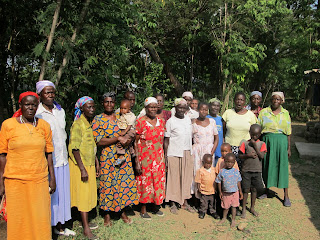We enjoyed friendly welcomes, saw beautiful smiles on children and experienced the postcard-perfect safari plain, but couldn't ignore shanties along the highway and trash strewn about, or avoid hearing stories of HIV orphans and the aftermath of recent political violence, or close our eyes to some real poverty and suffering in the fishing camps or other slums we walked through.
This post isn't to wax about the paradox. We met several people actively doing something about their country's struggles, and I prefer to share those stories. You need to know them to know about modern Kenya, and perhaps learn about how to help, yourself.
 |
| Marren Ojode, me, and Vitalis Ojode, at their home in Runda. |
About 23 years ago Marren was a founding member of the Sanja Women's Group, a community organization that was formed to help women socially and economically, particularly in rural areas near Lake Victoria, where Rusinga Island is found. At the time water-born disease was a major threat, so one of the first initiatives was a series of clean water projects.
Sanja Women's Group was accepted by the government's Ministry and Culture and Social Services, and today women's groups exist throughout the country through a similar government office, including 16 near Lake Victoria. They are not funded by the government, though they do receive assistance through training workshops and grant possibilities. Two men are allowed to join each group as advisors.
Women are at several disadvantages in African culture, a male-dominated society in many ways. With the HIV epidemic, women are often widowed without an education or job skills to fall back upon. They are less likely to be educated because girls drop out of school if they become pregnant. Because of the demands of running households, particularly in rural areas, women are less likely to have job skills that translate outside of the home. If a husband dies or leaves, the woman is left with few resources, and in a economy as insular as that of Rusinga Island, options are very limited.
The women's groups have been a positive force in changing that paradigm. Through health and HIV education, economic training and cooperative businesses organized by groups, clean water projects and simply connecting women in a organizational structure, they promote healthier and more independent women, which in turn produces a more stable and successful community. Marren remains involved in the effort that has spread across Kenya, and the conference in New York was to further training she would bring back to her home country.
 |
| The Carlton Peterson Women's Group, Kaswango. |
The district is located on a hill that overlooks Kamasengre, where we stayed. At the higher elevation the women struggle to adequately irrigate their crops. The sukuma wiki in their shamba was smaller than crops we saw around the island, inhibiting the group's ability to harvest and sell to share profits between members. Without a pump system to bring water up the hill, farm manager Joyce Awuor told us, the labor required to keep the farm going, particularly during drought years, is an incredible obstacle to success on a large enough scale to affect the dozen women in the group.
 |
| Timm helps the Peterson Women's Group with the nightly irrigation. |
But the Peterson group was fortunate to have land, leased at no charge by the male advisor, and supplies for a nascent business in making and selling hand soap door to door. They also offer health classes for girls, and help in fencing what are called "kitchen gardens," so families can grow vegetables for themselves that will not be eaten by stray goats. Last, and perhaps most encouraging, was the average age of the Peterson group's members. Several appeared to be in their twenties or perhaps early thirties, and involvement from the younger generation must be a sign that growth is possible, if not inevitable with the energy and desire we heard.
The second group we met was the Kamasengre West Women's Group, a more established organization with an older membership. The Kamasengre group has more than 20 members, who sell vegetables from their garden and have raised trees to be sold and planted around Rusinga over several years. With a shamba located on the shore of Lake Victoria, and thanks to some help in building a pump and fence from the nonprofit Soul Source Foundation and our friends Matt Peterson, Luke Bruckner and Peter Morris, the Kamasengre women have made their shamba a model of a good farm. In addition, those three and Gayle Hammer, another friend of ours who spent three months on Rusinga, helped the women craft a business plan that has taught them bookkeeping, investment planning and farm management.
 |
| Lunch with the women of Kamasengre West. |
The story of these women's groups is encouraging, but also far from complete. As I wrote before, the Kamasengre group benefited greatly in the past year from the help of four Americans, though unfortunately that hands-on guidance is rare. Soul Source Foundation, which is the non-profit that Operation My People also operates through, has the mission of making that help, either in person or financially from abroad, more common. To read more about that organization's mission and background, visit its website.


Giving back to your community Mr.David Nelson.wonderful
ReplyDelete